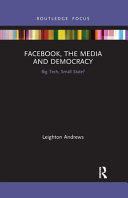

Most ebook files are in PDF format, so you can easily read them using various software such as Foxit Reader or directly on the Google Chrome browser.
Some ebook files are released by publishers in other formats such as .awz, .mobi, .epub, .fb2, etc. You may need to install specific software to read these formats on mobile/PC, such as Calibre.
Please read the tutorial at this link: https://ebookbell.com/faq
We offer FREE conversion to the popular formats you request; however, this may take some time. Therefore, right after payment, please email us, and we will try to provide the service as quickly as possible.
For some exceptional file formats or broken links (if any), please refrain from opening any disputes. Instead, email us first, and we will try to assist within a maximum of 6 hours.
EbookBell Team

4.8
54 reviewsFacebook, the Media and Democracy examines Facebook Inc. and the impact that it has had and continues to have on media and democracy around the world.
Drawing
on interviews with Facebook users of different kinds and dialogue with
politicians, regulators, civil society and media commentators, as well
as detailed documentary scrutiny of legislative and regulatory proposals
and Facebook’s corporate statements, the book presents a comprehensive
but clear overview of the current debate around Facebook and the global
debate on the regulation of social media in the era of ‘surveillance
capitalism.’ Chapters examine the business and growing institutional
power of Facebook as it has unfolded over the fifteen years since its
creation, the benefits and meanings that it has provided for its users,
its disruptive challenge to the contemporary media environment, its
shaping of conversations, and the emerging calls for its further
regulation. The book considers Facebook’s alleged role in the rise of
democratic movements around the world as well as its suggested role in
the election of Donald Trump and the UK vote to leave the European
Union.
This book argues that Facebook, in some shape or
form, is likely to be with us into the foreseeable future and that how
we address the societal challenges that it provokes, and the economic
system that underpins it, will define how human societies demonstrate
their capacity to protect and enhance democracy and ensure that no
corporation can set itself above democratic institutions. This is an
important research volume for academics and researchers in the areas of
media studies, communications, social media and political science.